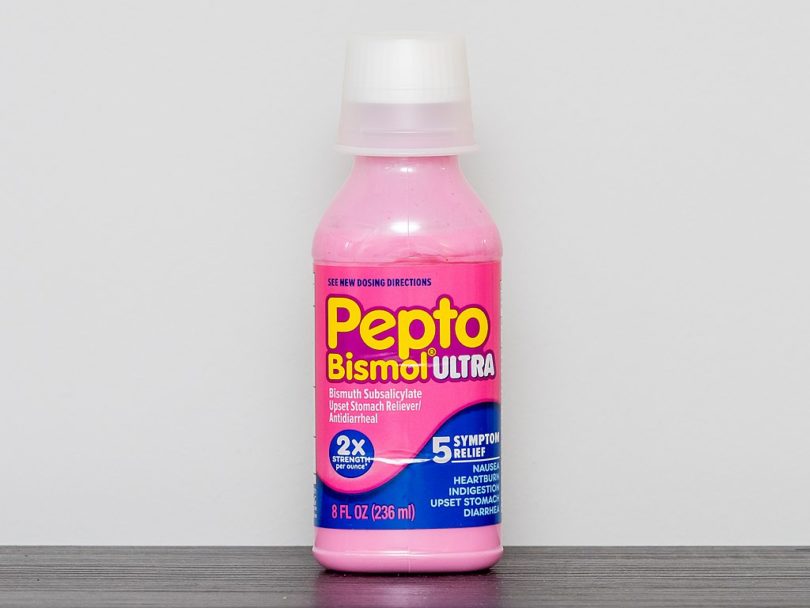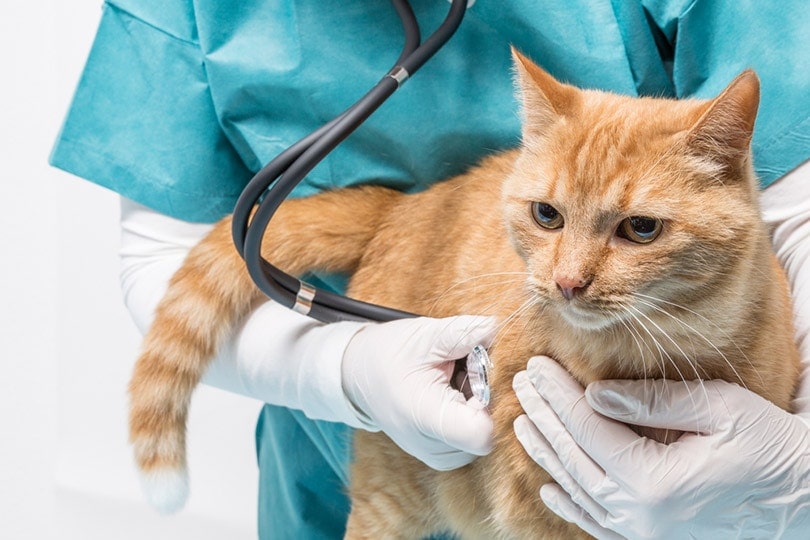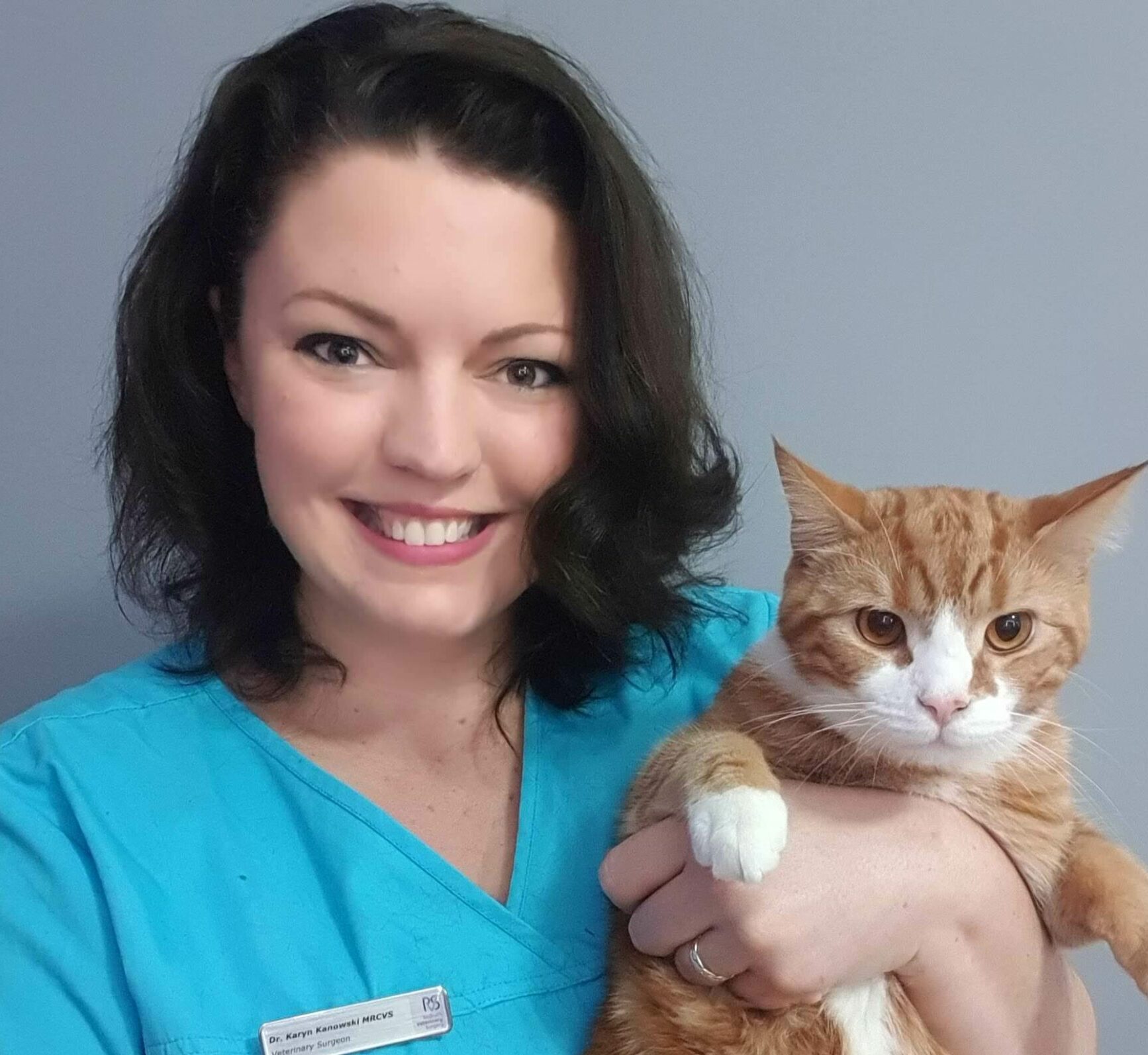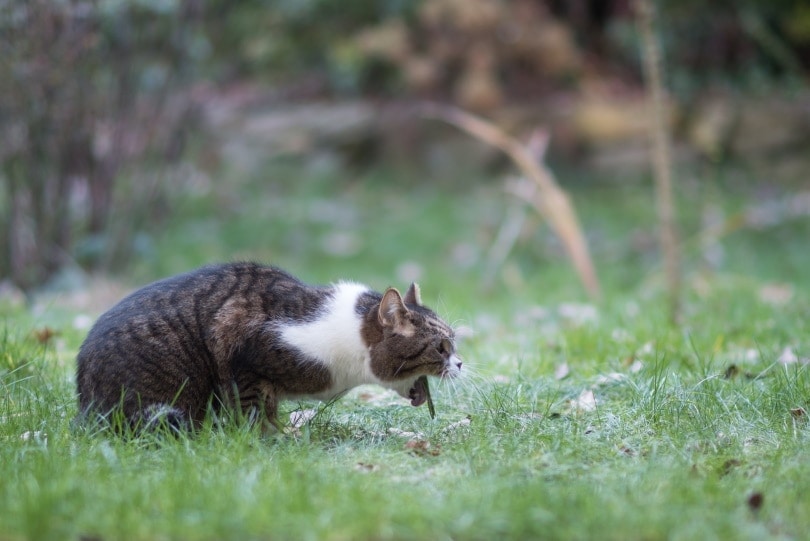Can You Give a Cat Pepto Bismol For An Upset Stomach? Our Vet Explains

Updated on

Many people reach for that familiar pink bottle of Pepto Bismol when they have an upset stomach. The label (and catchy commercials) say that Pepto Bismol is good for nausea, heartburn, indigestion, upset stomach, and diarrhea. But when your cat gets sick, will it work on them? Is Pepto Bismol save to give to your cat?
There are many medications made for humans that can be harmful and toxic to our beloved pets. But there are a few medications we can safely recommend as veterinarians for people to give to their pets in a pinch. Continue reading to find out if you can safely give your cat Pepto Bismol for an upset stomach.
What Is Pepto Bismol?
Nowadays there are a lot of different products, flavors, and formulations that Pepto Bismol makes. For the purpose of this article, we will focus on the Pepto Bismol Original Formula Liquid.
Pepto Bismol is made from Bismuth Subsalicylate, Benzoic Acid, coloring, flavoring, and Gellan Gum. The main ingredient, Bismuth Subsalicylate, is a type of salt of salicylic acid. You may have also heard of aspirin, which is another derivative of salicylic acid. In other words, the main ingredient in Pepto Bismol is similar to aspirin.
Salicylates are found naturally in some plants and have been used for multiple different medical conditions. Keep in mind that these medical conditions are in reference to humans and are not widely used for our feline and canine companions.
Benzoic Acid is meant to protect against bacterial growth. Unfortunately, there are no current studies in cats on potential toxicity to cats after ingestion of this product. In other words, we have no idea if this is safe or not in cats, and/or what a toxic dose may be.
The Gellan Gum is a thickener for the liquid product. Currently, there are no known toxic side effects to this ingredient in cats.

But I Thought You Could Give Cats Baby Aspirin?
Being able to safely give your pets baby aspirin as an analgesic is not widely recommended by veterinarians anymore. Veterinary medicine and medication options have come a long way over the past few decades and we now have access to much better analgesia. Baby aspirin, or adult aspirin, when studied in animals does not offer a great level of pain control. Not to mention that there is a level of toxicity that can occur in both dogs and cats. Toxic side effects can include gastric (stomach) ulcers (which can also lead to bleeding), liver toxicity, kidney toxicity, and a condition called methemoglobinemia.
Methemoglobinemia is a long fancy word that means the toxin destroys oxygen carrying capability of cells in the body. This can lead to difficulty breathing, seizures, mental impairment and other organ damage.
Please remember that cats are not small dogs, and dogs are not small humans. In other words, they are all different species. Different species metabolize and utilize some medications very differently from one another. This is incredibly important to keep in mind next time you are considering giving your cat any OTC medication.
Due to their small body size, there is a very small window of safety to dose a cat aspirin and potentially cause toxicity. As much as a half or a full pill may be enough to cause severe damage to your cat. Therefore, the use of baby aspirin is no longer widely recommended amongst veterinary professionals except for very specific conditions.
But I Read Online That Pepto Bismol and Aspirin Are Safe
I understand there is a lot of information out there about all types of OTC (over-the-counter) medications. You’ll read stories and blogs from pet owners or even veterinary professionals who may have purposely or accidentally given a cat aspirin and that pet was fine. However, it only takes one time to cause severe or potentially lethal toxicity. Please be aware when you are reading information online if it’s coming from a licensed veterinarian, or just an opinionated blog post.
If you have any questions about what you should and should not give your cat, please call your regular veterinarian or the local emergency clinic. Emergency veterinarians are great resources as they tend to see a much higher volume of toxicity cases than your regular daytime veterinarian. If you are unable to reach either of those, the ASPCA Poison Control Center is the best resource for any pet parent with any potential or known toxin exposure.

What Can I Give if My Cat Is Sick Besides Pepto Bismol?
The best answer is nothing. Because we always recommend complete evaluation by a veterinarian prior to administering any medications, we do not blindly recommend any OTC medications. If your cat has an upset stomach (vomiting, anorexia, diarrhea) simply take up the food and water bowls for 12-24 hours. Offer them nothing by mouth. And we mean nothing. If your cat is nauseous, please do not try to tempt them with human food, treats, and snacks. Take all food and water away. If your cat stops vomiting during the fasting period, then offer small amounts of water and food every few hours for a few days.
If your cat continues to vomit, we recommend you follow up with your regular veterinarian the next day.
Conclusion
Pepto Bismol is not recommended as a safe OTC medication to give to your cat. While this medication is fairly benign in humans, there can be severe toxic effects and even fatalities secondary to some of the ingredients. If your cat has an upset stomach, we recommend contacting your veterinarian and fasting them until you can be seen. Please remember that cats are not dogs and dogs are not small humans. Each species is different, and what’s safe for us may not be safe for our cats.
See also:
Featured Image Credit: Pepto Bismol Ultra Image Credit: ajay_suresh, via Wikimedia Commons CC BY 2.0)















